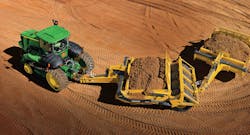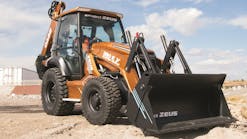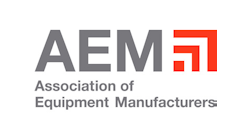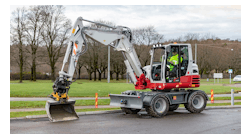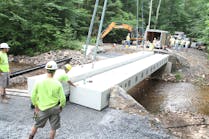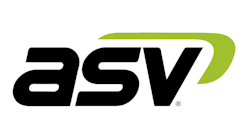Founded in 2001 as a small crew focused on commercial flatwork, Concrete Technology Incorporated (CTI) (Grimes, Iowa) has grown to more than 150 employees and has expanded its scope of services to include heavy highway paving, DOT and municipality work.
CTI has also expanded to include both ready-mix and recycling divisions. “Our paving side is kind of our bread-and-butter now, but we also have a pretty good size of commercial crews that do [data centers], your bigger warehouses, [gas stations]—a lot of that,” explains Charlie Knudsen, paving operations manager, CTI. “So we do a little of everything. We even started recycling back about five years ago, where we crush our own stone. And then we have a sister ready-mix company so we can haul our own concrete also.”
Essential EquipmentCompact track loaders play a critical role in CTI’s daily operations, from unloading trucks and moving rebar around job sites, to finish grading and material removal. “They play a big part in our day-to-day operations. We have roughly 16 loaders in our fleet, every crew's got one,” Knudsen says. “It's our main tool. Just like our job trailers or pickups.”
In addition to his role as paving operations manager, Charlie Knudsen is also responsible for fleet management and acquisition. With more than 12 crews operating on any given day, making the right equipment decisions has a significant impact on the business. “I look at what size of machine I need. And then I sit down with everybody and say, ‘this is what I'm looking at for machines.’ And then once I get all my information put together from all the different suppliers, I look at horsepower, lifting capacity, reach—because we're loading up dump trucks with broken concrete, we're unloading semi-loads of steel. So I’ve got to know our picking capacity, how [fuel] efficient they are. And then at the end of the day, too, its price point.”
When it was time to expand their fleet, Knudsen was looking for a machine that had the durability, strength and lift capacity of a large-frame CTL, with the benefits of a lower horsepower machine. CTI worked with Titan Machinery of Ankeny, Iowa to purchase five CASE TV370B CTLs. The TV370B is part of CASE’s next-generation line of skid steers and track loaders, and CTI was one of the first companies to adopt the new series.
The TV370B is a 74 horsepower CTL with a 3,700-pound rated operating capacity (at 50 percent of tipping load) and a vertical-lift design. The machine features a maintenance-free DOC-only (Diesel Oxidation Catalyst) Tier 4 Final emissions solution – there is no diesel particulate filter (DPF), no DPF regeneration, and no diesel exhaust fluid (DEF) required.
With the amount of loading and hauling that its CTLs do on their job sites, the vertical-lift configuration was a key consideration for CTI. “We load out broken concrete, or if we've got excess top piles of dirt or rock, we’ve got to be able to reach dump trucks,” Knudsen says. “Some of them have boards on the side. We just want to make sure we have enough reach for them. And then when we get shipments of steel in from direct suppliers, we’ve got baskets that are on high decks or long steel. So we want to make sure if we're picking bundles off of each other, we’ve got enough pick that we can lift up and not stroke out. So we're always reaching above.”
With a rated operating capacity of 3,700 pounds, the TV370B provides the right amount of power for CTI’s needs. “With these bundles, the baskets, they come about 22 in a bundle and about two bundles, the average weight is about 3000 [pounds],” Knudsen explains. “Where a guy picks it up, we know he's not going to tip into the side of the trailer, break out a window, that kind of thing. The more picking power the better. We're always picking heavier, not lighter.”
New Technology Makes an ImpactThe TV370B features a completely redesigned operator interface, including new left- and right-hand posts with simple ignition, push-button operation, easy throttle control and intuitive switches for all core machine functions. It also includes the industry’s only backup camera visible in a split-screen display. The camera is operational in both forward and reverse and enhances visibility with even greater job site perspective and awareness.
Shea Arter, trim supervisor for CTI, is responsible for all of the company’s steel layout, setup and finish grading on road projects. He likes the new TV370Bs for the ease-of-use, and the ability to customize controls and other machine parameters to meet the preferences of the operator. “The joystick's a lot more user-friendly,” Arter says. “We like the new LCD display screen, the camera. You can customize it a little easier to each operator, so I could slow down or speed up the tracks, or the bucket, or the lifts.”
“I can stick a newer guy in it, and he'd be comfortable,” he continues. “With the LCD screen, it's just way simpler for these guys to go in, sit in the machine, go to the settings they like, and then just kind of go from there.”
Visibility is enhanced by the new backup camera as well as a cab-wide rearview mirror that comes standard on all CASE B Series CTLs. Rear visibility is further aided by low-profile rear hoods and an extremely low-profile H-Link on vertical-lift models that doesn’t impede visibility to the rear when compared to other similar machines.
“[Visibility] is a huge deal for me, especially when we're grading small pieces,” Arter explains. “I’ve got guys setting forms right next to me, we’ve got guys checking grade behind them... We’ve got to see on a job site like this. There are a lot of people around us, a lot of moving parts. Visibility's a huge key for us, and sitting inside those loaders, it's a clear view back. The camera, it's just extra safety. It's awesome.”
Even though the machine is smaller than CTLs that he’s run in the past, Arter says that the TV370B has plenty of power. “To me, it's definitely still capable of doing everything I need it to do, even with going down in size,” he says. “Those machines run 24/7 a lot—all day for me—and it's critical that I have a machine on-site to do the work I need to do.”
Downtime is a killer, and CTI’s partnership with Titan Machinery has helped keep their equipment fleet in optimal shape and ready to work.
“I like the customer service that comes with it through the service department. That is a huge thing for us,” Arter explains. “We want an honest answer so we can plan for it. And they've been good. If we've got to bring the machine in, they give us a machine or work out a deal with us so we can keep moving and we're not scrambling. And we can keep day-to-day production up. They've been coming out, servicing in a timely fashion. It's a key indicator of our day-to-day operation.”





